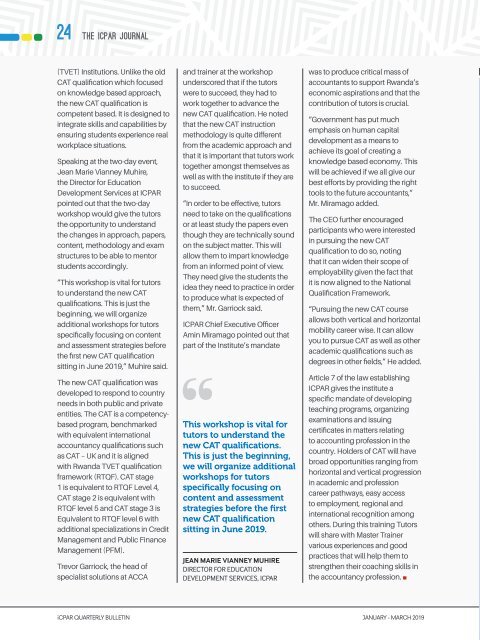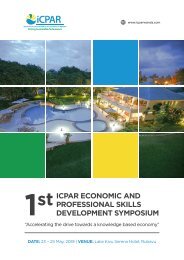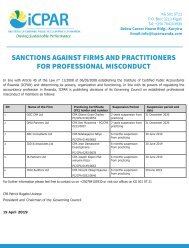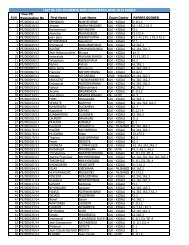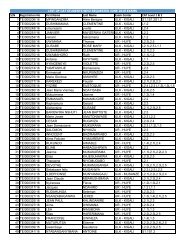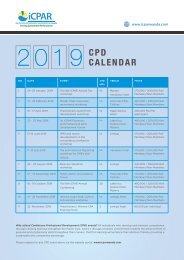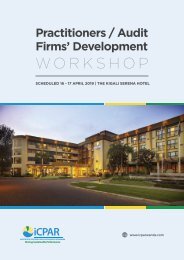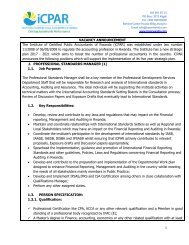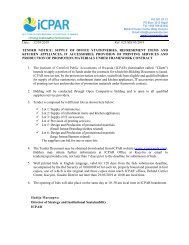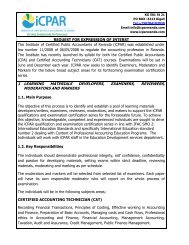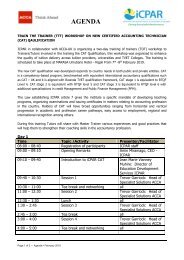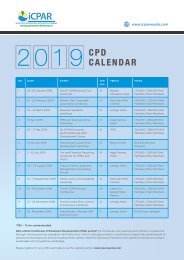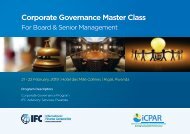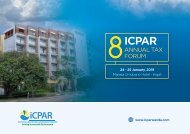iCPARQuarterlyBulletin-March2019
You also want an ePaper? Increase the reach of your titles
YUMPU automatically turns print PDFs into web optimized ePapers that Google loves.
24 THE iCPAR JOURNAL<br />
(TVET) Institutions. Unlike the old<br />
CAT qualification which focused<br />
on knowledge based approach,<br />
the new CAT qualification is<br />
competent based. It is designed to<br />
integrate skills and capabilities by<br />
ensuring students experience real<br />
workplace situations.<br />
Speaking at the two-day event,<br />
Jean Marie Vianney Muhire,<br />
the Director for Education<br />
Development Services at ICPAR<br />
pointed out that the two-day<br />
workshop would give the tutors<br />
the opportunity to understand<br />
the changes in approach, papers,<br />
content, methodology and exam<br />
structures to be able to mentor<br />
students accordingly.<br />
“This workshop is vital for tutors<br />
to understand the new CAT<br />
qualifications. This is just the<br />
beginning, we will organize<br />
additional workshops for tutors<br />
specifically focusing on content<br />
and assessment strategies before<br />
the first new CAT qualification<br />
sitting in June 2019,” Muhire said.<br />
The new CAT qualification was<br />
developed to respond to country<br />
needs in both public and private<br />
entities. The CAT is a competencybased<br />
program, benchmarked<br />
with equivalent international<br />
accountancy qualifications such<br />
as CAT – UK and it is aligned<br />
with Rwanda TVET qualification<br />
framework (RTQF). CAT stage<br />
1 is equivalent to RTQF Level 4,<br />
CAT stage 2 is equivalent with<br />
RTQF level 5 and CAT stage 3 is<br />
Equivalent to RTQF level 6 with<br />
additional specializations in Credit<br />
Management and Public Finance<br />
Management (PFM).<br />
Trevor Garriock, the head of<br />
specialist solutions at ACCA<br />
and trainer at the workshop<br />
underscored that if the tutors<br />
were to succeed, they had to<br />
work together to advance the<br />
new CAT qualification. He noted<br />
that the new CAT instruction<br />
methodology is quite different<br />
from the academic approach and<br />
that it is important that tutors work<br />
together amongst themselves as<br />
well as with the institute if they are<br />
to succeed.<br />
“In order to be effective, tutors<br />
need to take on the qualifications<br />
or at least study the papers even<br />
though they are technically sound<br />
on the subject matter. This will<br />
allow them to impart knowledge<br />
from an informed point of view.<br />
They need give the students the<br />
idea they need to practice in order<br />
to produce what is expected of<br />
them,” Mr. Garriock said.<br />
ICPAR Chief Executive Officer<br />
Amin Miramago pointed out that<br />
part of the Institute’s mandate<br />
This workshop is vital for<br />
tutors to understand the<br />
new CAT qualifications.<br />
This is just the beginning,<br />
we will organize additional<br />
workshops for tutors<br />
specifically focusing on<br />
content and assessment<br />
strategies before the first<br />
new CAT qualification<br />
sitting in June 2019.<br />
JEAN MARIE VIANNEY MUHIRE<br />
DIRECTOR FOR EDUCATION<br />
DEVELOPMENT SERVICES, ICPAR<br />
was to produce critical mass of<br />
accountants to support Rwanda’s<br />
economic aspirations and that the<br />
contribution of tutors is crucial.<br />
“Government has put much<br />
emphasis on human capital<br />
development as a means to<br />
achieve its goal of creating a<br />
knowledge based economy. This<br />
will be achieved if we all give our<br />
best efforts by providing the right<br />
tools to the future accountants,”<br />
Mr. Miramago added.<br />
The CEO further encouraged<br />
participants who were interested<br />
in pursuing the new CAT<br />
qualification to do so, noting<br />
that it can widen their scope of<br />
employability given the fact that<br />
it is now aligned to the National<br />
Qualification Framework.<br />
“Pursuing the new CAT course<br />
allows both vertical and horizontal<br />
mobility career wise. It can allow<br />
you to pursue CAT as well as other<br />
academic qualifications such as<br />
degrees in other fields,” He added.<br />
Article 7 of the law establishing<br />
ICPAR gives the institute a<br />
specific mandate of developing<br />
teaching programs, organizing<br />
examinations and issuing<br />
certificates in matters relating<br />
to accounting profession in the<br />
country. Holders of CAT will have<br />
broad opportunities ranging from<br />
horizontal and vertical progression<br />
in academic and profession<br />
career pathways, easy access<br />
to employment, regional and<br />
international recognition among<br />
others. During this training Tutors<br />
will share with Master Trainer<br />
various experiences and good<br />
practices that will help them to<br />
strengthen their coaching skills in<br />
the accountancy profession.<br />
iCPAR QUARTERLY BULLETIN<br />
JANUARY - MARCH 2019


